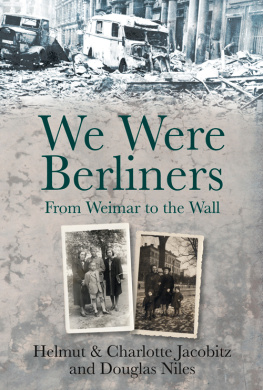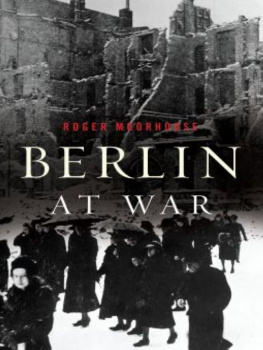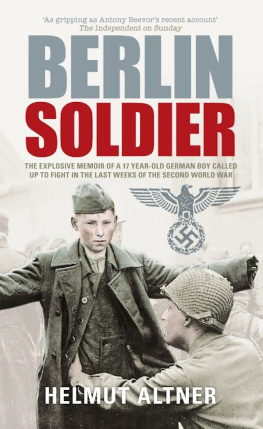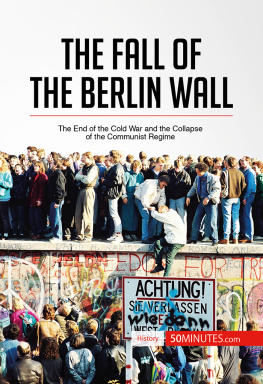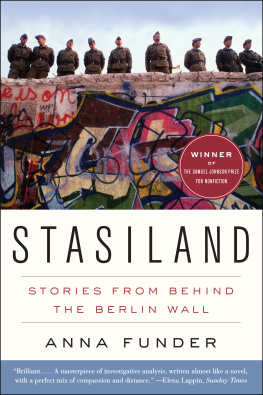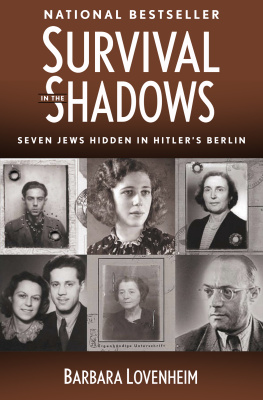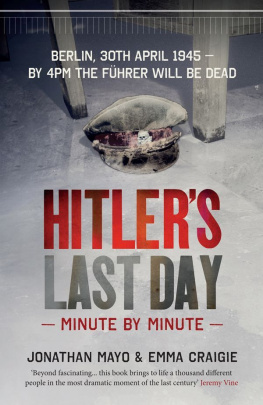
For our family, and for Berlin
Helmut & Charlotte Jacobitz
For my father, Donald Niles,
who brought me up to love the stories history has to tell
Douglas Niles
Contents
I didnt know Jason Jacobitz when he telephoned me one day in 2009 with an interesting proposition. Throughout his life the young Californian had listened to his grandfather, Helmut, talk about his experiences during the Second World War, and Jason wondered if those remembered stories might form the content of a book. Helmut, now a German-American in Los Angeles, was a Berliner by birth, and had been drafted into the Luftwaffe the German air force during the war.
Although he hoped and expected to become an aircraft mechanic, Helmut had instead been given a rifle and was informed that he would be a paratrooper. His subsequent path took him to Normandy, France, where he and his battalion arrived shortly after several hundred thousand British, American and Canadian soldiers had pushed their way on to the European mainland over the D-Day beaches.
The genesis of this book, as much as anything, is Jasons determination to see the story told. I learned that he picked me as a co-author because hed enjoyed one of my adventure novels, a story written nearly twenty years ago; and that hed been disappointed with the several experienced ghostwriters hed already interviewed. In his frustration, I gather that I became something of a last resort.
The idea of the book was intriguing to me, and I leapt at the opportunity. I have always been fascinated by the history of the Second World War, and have written numerous articles and designed several military simulations on the topic. The chance to tell the true story of a man who had been there was irresistible. We agreed that Jason would record extensive conversations with his grandfather, send me the recordings, and I would turn the interviews into an autobiographical narrative.
Jason started the project by spending several weekends at his grandparents kitchen table, listening and recording while they both reminisced, and a funny thing happened. Jason and I realised that this is not just a Second World War story in fact, it is not just Helmuts story. For one thing, Helmuts wife (and Jasons grandmother) Charlotte was every bit as much of a Berliner as Helmut. She, too, had a compelling story of her experiences during the war years. (During one of the interviews, an astonished Jason tells her You saw more of the war than Grandpa did!) Secondly, the Jacobitzs were present for many of the most significant events of modern German and European history, events that occurred before, during and after the Second World War.
Berlin is far more than just the largest city in, and the capital of, Germany. It is a symbol of German history, pride and hubris; and it has paid the price, in spades, for its part in that history. It is the place where Hitler seized power; where the Nazis planned their most dastardly acts; where the Allies Britain and the United States through the air, the Soviet Union on the ground took their ultimate revenge against the Third Reich; and the place where the Cold War became focused like a laser beam, and very nearly turned hot. Finally, when the Communist Empire collapsed like a house of cards, Berlin was the first and most crucial card pulled from that deck.
So the book expanded to become the story of both Jacobitzs, from their childhoods, through the war, to marriage and parenthood and eventual emigration. And it expanded again when we realised that the story called for context, for historical perspective of events occurring beyond the immediate scope of Helmut and Charlottes lives and memories. To that end, I have framed the autobiographical sections with passages in the mode of popular history, so that the personal events are placed against the backdrop of epic happenings.
For more than a year, Jason made many trips from San Diego to Los Angeles to interview his grandparents, compiling dozens of hours of recordings, ferreting out details long buried. Occasionally his cousin Nicholas would join him for the recording sessions.
Near the end of the writing process, I travelled from Wisconsin to Los Angeles to meet and be charmed by the Jacobitzs. They are in their mid-eighties now, but they were energetic and personable as we chatted at their kitchen table, in a beautiful home high in the foothills of the San Gabriel Mountains. We talked for hours on end, several days in a row as they shared with good humour and insight more of their experiences, answering my questions and filling in the blanks of the story. They both speak English well, but when they put their heads together to discuss, in German, some aspect of the story they recalled from different perspectives, a listener gets a clear picture of the Berliners they were, and will always be.
To transcribe the recorded interviews I used the able assistance of Andrea Roberts, a young lady whose accurate transcripts became my invaluable working tools. She put in many hours with headphones on her ears and keyboard at her fingertips, wrestling with German terms and, occasionally, Helmuts accent, as she created the clean, crisp copy that made my job immeasurably easier.
Another fortuitous occurrence moved us forward when my friends Matt Forbeck and Stephen Sullivan put me in contact with their associate Steven Savile, who in turn connected me with Jay Slater, at The History Press. Jay embraced the concept of the book from his initial look at the idea, and has been an enthusiastic supporter in moving this project toward publication. My good friends of the Alliterates Writing Society have also been very helpful, as always, in listening to sample sections read aloud, and providing me with astute criticisms. Stephen Sullivan gave me further help when he rendered my two hand-drawn maps into the versions published in this book.
However, mostly this book exists because two wonderful people were willing to share their story with the world, and because they had a grandson who cared enough to make sure that it happened. To all the Jacobitzs, I can only say thank you, and it is a privilege to be involved in your story.
Douglas Niles
Delavan, Wisconsin


My father pushed me along in my stroller, running as fast as he could. Fascists and communists were shooting at each other right down the street, and he was terrified. I was too young to be frightened. He told me later that I laughed and clapped my hands the whole way home.
Charlotte Jacobitz
The First World Wars four-year cannonade finally faded into silence on 11 November 1918. The Great War left a continent shattered, battered and exhausted from the struggle that had commenced in August 1914. An entire generation of young men had been sacrificed on the altars of barbed wire, machine guns and poison gas. A communist convulsion had transformed Tsarist Russia into the fledgling Union of Soviet Socialist Republics; in 1918, that vast nation remained locked in a bloody civil war.
The Allied nations of Britain, France, Italy and the United States had emerged bloodied but victorious. One half of the defeated Central Powers, Germanys erstwhile ally in the First World War, had been the long-standing Austro-Hungarian Empire. With the final defeat, that empire simply ceased to exist. At wars end the sprawling monarchy, also remembered as the Habsburg Empire, which had always been made up of feuding ethnic minorities, was broken by the victorious Allies into newly formed nations, including Czechoslovakia, Hungary, Austria, Romania, Bulgaria, Albania and Yugoslavia.
Next page
